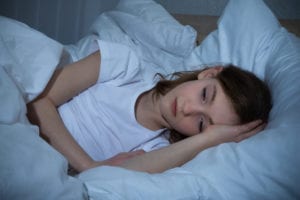Written by Joyce Smith, BS. This study offers a brief, tailored behavioral sleep intervention for children with ADHD and sleep problems that not only improves sleep but also the severity of ADHD symptoms, behavior, daily functioning, quality of life, and working memory, six months after randomization.
 Attention deficit hyperactivity disorder (ADHD) affects approximately 5% of children and adolescents 1 and is characterized by pervasive, developmentally inappropriate levels of inattention, impulsivity, and hyperactivity. These children are often academic underachievers 2, school dropouts 2 and demonstrate risk taking behaviors 3 and psychiatric difficulties4. In the United States, annual costs of ADHD (healthcare, education, justice) are estimated to be $143-266 billion 3.
Attention deficit hyperactivity disorder (ADHD) affects approximately 5% of children and adolescents 1 and is characterized by pervasive, developmentally inappropriate levels of inattention, impulsivity, and hyperactivity. These children are often academic underachievers 2, school dropouts 2 and demonstrate risk taking behaviors 3 and psychiatric difficulties4. In the United States, annual costs of ADHD (healthcare, education, justice) are estimated to be $143-266 billion 3.
Previous studies have sought to improve sleep and ADHD symptom severity. Two randomized, double-blind placebo-controlled trials demonstrated that melatonin reduced the time required to fall asleep, but did not affect ADHD symptoms or quality of life 5. The authors (Hiscock et al) hypothesized that a behavioral sleep intervention would improve many conditions such as the severity of ADHD symptoms (primary outcome), sleep problems, behavior, quality of life, daily functioning, and working memory in children, as well as the mental health and work attendance of their parents.
The Hiscock team’s randomized, non-blinded, controlled trial 6 included 244 children, aged 5-12 years, with ADHD who attended twenty-one general pediatric practices in Victoria, Australia between 2010 and 2012. All children reported moderate-to-severe sleep problems, and most were taking stimulants. Families were randomized to either usual clinical care or a sleep intervention in which clinicians educated families on normal sleep, sleep cycles, and sleep hygiene and designed for them an individual behavioral sleep management plan. The sleep intervention was delivered during two in-person sessions and one telephone call.
At 3 and 6 months, the intervention group, compared to control families, had significantly greater improvement in parent-reported ADHD symptoms than the control group (P=0.03, P=0.004, respectively). Intervention children were also less likely to report significant sleep problems at three months (56% v 30%; P<0.001) and six months (46% v 34%; P=0.07). Behavior, quality of life, and memory were all improved with the intervention and approximately a half to one third of the beneficial effects of the intervention on ADHD symptoms occurred because of improved sleep, at three and six months.
Study strengths include a large sampling of children, making generalization to most children with ADHD and sleep problems feasable. Study limitations include parent response bias since parents knew whether their child was in the treatment or placebo groups. Also the study participation may have been biased to more highly motivated families.
The behavioral sleep intervention modestly improved ADHD symptom severity in children with ADHD, most of whom were taking stimulant medications. It also offered additional benefits of a greater impact on sleep quality and duration. It taught parents to set limits around bedtime, manage a child’s anxiety related to insomnia and equipped parents to better manage oppositional behavior and anxiety, thus improving their child’s quality of life. Most of the benefits were sustained up to six-months post-intervention suggesting it may be appropriate for use in primary and secondary care.
Source: Hiscock, Harriet, Emma Sciberras, Fiona Mensah, Bibi Gerner, Daryl Efron, Sonia Khano, and Frank Oberklaid. “Impact of a behavioural sleep intervention on symptoms and sleep in children with attention deficit hyperactivity disorder, and parental mental health: randomised controlled trial.” Bmj 350 (2015): h68.
This is an Open Access article distributed in accordance with the Creative Commons Attribution Non Commercial (CC BY-NC 4.0) license, http://creativecommons.org/licenses/by-nc/4.0/.
Click here to read the full text study.
Posted August 30, 2019.
Joyce Smith, BS, is a degreed laboratory technologist. She received her bachelor of arts with a major in Chemistry and a minor in Biology from the University of Saskatchewan and her internship through the University of Saskatchewan College of Medicine and the Royal University Hospital in Saskatoon, Saskatchewan. She currently resides in Bloomingdale, IL.
References:
- Polanczyk G, de Lima MS, Horta BL, Biederman J, Rohde LA. The worldwide prevalence of ADHD: a systematic review and metaregression analysis. The American journal of psychiatry. 2007;164(6):942-948.
- Barbaresi WJ, Katusic SK, Colligan RC, Weaver AL, Jacobsen SJ. Long-term school outcomes for children with attention-deficit/hyperactivity disorder: a population-based perspective. Journal of developmental and behavioral pediatrics : JDBP. 2007;28(4):265-273.
- Barkley RA, Fischer M, Smallish L, Fletcher K. Young adult outcome of hyperactive children: adaptive functioning in major life activities. Journal of the American Academy of Child & Adolescent Psychiatry. 2006;45(2):192-202.
- Yoshimasu K, Barbaresi WJ, Colligan RC, et al. Childhood ADHD is strongly associated with a broad range of psychiatric disorders during adolescence: a population-based birth cohort study. Journal of child psychology and psychiatry, and allied disciplines. 2012;53(10):1036-1043.
- Van der Heijden KB, Smits MG, Van Someren EJ, Ridderinkhof KR, Gunning WB. Effect of melatonin on sleep, behavior, and cognition in ADHD and chronic sleep-onset insomnia. Journal of the American Academy of Child and Adolescent Psychiatry. 2007;46(2):233-241.
- Hiscock H, Sciberras E, Mensah F, et al. Impact of a behavioural sleep intervention on symptoms and sleep in children with attention deficit hyperactivity disorder, and parental mental health: randomised controlled trial. Bmj. 2015;350:h68.
